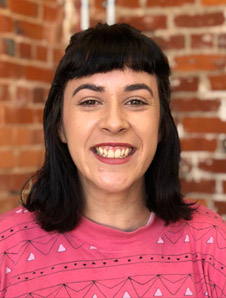

Lisa Blakie
Lisa Blakie (Ngāi Tahu): Fostering positive gaming communities
20Twenties Young Alumni Award recipient for her contribution to creative and ethical video game development. BA(Hons) 2015.
 What was your reaction to receiving the award?
What was your reaction to receiving the award?
I was very, very surprised, but really happy to represent Media, Film and Communication Studies, the “woke” subject matter that I studied and love.
 What have you done since graduation and what are you doing now?
What have you done since graduation and what are you doing now?
I started working at local [Dunedin] mobile games studio Runaway while I was still studying during my honours year. I've been there for five years this month! I started as a Community Manager and have since moved into a Narrative Designer role as well as being Community Director too.
Throughout these five years at Runaway I've been a writer and narrative designer for two published games and I am working on a third, soon to be released! I've also been responsible for supporting our growing player base, the majority of whom are women.
Outside of day to day mahi, I have been privileged to speak at different occasions nationally and internationally about a variety of topics across games including indigenous game development, fostering positive gaming communities and games and politics in general.
I have been fortunate to receive scholarships to attend the Game Developers Conference (GDC) in San Francisco from the NZ Game Developers Association and Pixelles. These opportunities were paramount to my development as a member of the game industry. I have also spent time serving on the NZ Game Developers Association Board; helped facilitate the NZ Game Developers Conference; run workshops at the NZ Games Festival and am responsible for organising the Dunedin Game Developer meetups with help from Kylie at Signal ICT Grad School, Toby from Shape Creative and the Centre of Digital Excellence (CODE)
This year I was the recipient of the Te Maunga Kai Kapua Teina (Rising Star) award, one of the highlights of my career because it was a nomination from my peers. I never thought I would ever feel accepted by the game development community, because of whakamā or imposter syndrome. I'm really glad to have had this be proven wrong.
 What inspires and motivates you to work in the areas you are involved with?
What inspires and motivates you to work in the areas you are involved with?
Many marginalised people working in the games industry have experienced discrimination and abuse, either forcing them out of the industry or creating an unsafe and unsustainable working environment.
As a Māori woman, I was really fortunate to have a welcoming and supportive start in the industry and I want this to be the reality for any marginalised person entering the games industry. My main motivation to stay in games and do the mahi that I do is to make the games industry a safe and happy place for everyone to be a part of. The more diverse our industry is, the more diverse our games will be. Games are and always should be for everyone.
 What were the highlights of your time at Otago?
What were the highlights of your time at Otago?
My highlights from studying at Otago were meeting my best friends who I will treasure for the rest of my life. Their endless support played a huge role in me graduating and for that I am forever grateful.
I am also incredibly grateful to my tutors and lecturers for introducing me to writing critically about video games and nurturing what I am passionate about.